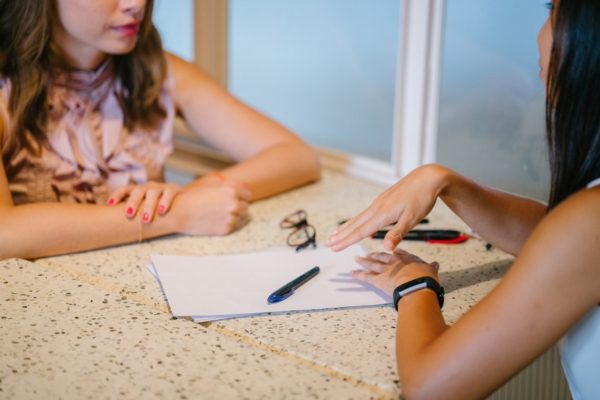The Goals of Couples Counseling
For many couples, the goals of couples therapy may involve learning how to create an easier, happier and more satisfying relationship. In some cases it may also involve deciding whether or not you should stay together.
Whatever your specific goals are, the therapist generally works with both partners to create a win-win situation where both partners feel heard and understood. Most importantly, the therapist helps to create a situation where both partners learn how to respond to each other in the best way without having to compromise any important values that they may hold.
5 Key Principles To Make Couples Counseling Work For You
1. Focus on yourself.
It is common to want your partner to change. It’s normal to believe that the problems are a result of his/her behavior. But this “blame game” is ineffective and often leads to defensiveness and a breakdown in communication.
It may also leave you feeling powerless. That’s because you cannot change another person – you can only change yourself! Instead, focus on your own role in the dynamics with emphasis on changing yourself. This will create the right environment for your partner to change as well.
Spend your time exploring ways in which you can contribute to positive change in the relationship. Ask yourself, “How am I contributing to the problem?” What can I do to change so that I can get more of what I want?”
2. Keep the bigger picture in mind.
If your focus is on the latest argument and misunderstanding you lose sight of what you are really trying to do. Try looking at the bigger picture – what type of relationship you want to have.
Next, ask yourself what needs to happen in order for this relationship to be possible. (Don’t forget to acknowledge the areas that are already good!) As mentioned before, focus especially on the changes you can make to steer the relationship in the right direction.
3. Be proactive.
Don’t wait until you’re with the counselor to begin thinking about the issues you would like to talk about. Spend some time before each session thinking about what you want to achieve and how you can move this process along.
Make sure that you work alongside the therapist. Don’t be afraid to give feedback about how you feel the sessions are going for you. It’s important to notify the therapist if you don’t feel like the counseling is headed in the right direction and to come for at least another session to create an opportunity to change course.
4. Give it time.
Be aware that difficult sessions are common and that therapy is a process, so try not to judge your progress on whether the sessions have been easy or not. Many times when couples feel like things are not going well, they are just a step away from an important breakthrough.
Another common mistake is stopping counseling at the first signs of relief and improvement. While this shift is great, many times it takes longer to integrate the new information and make permanent changes. Being proactive also means that you dedicate time and energy to working on the relationship, which includes making your relationship a priority in your life. This also means spending time on homework assignments or activities that the therapist may give.
5. Share your vulnerability.
Defensiveness is one of the biggest obstacles to healing in a relationship. Defensiveness is also the most common way of protecting ourselves from feeling hurt, being wrong, or feeling pain.
Unfortunately, when we are defensive, our partner generally becomes defensive too, and we get caught in a vicious negative cycle. Instead, try talking about what is going on for you, your feelings and your needs. Avoid blaming your partner, or criticizing them, as this only breeds defensiveness.
Beneath any feelings of defensiveness lies vulnerability and by sharing this vulnerability you take leaps towards healing your relationship. Ask yourself, “What am I really feeling and why?” and “What is hard to share with my partner – what hurt, sadness, underlying needs and vulnerability am I trying to protect?”
How to Prepare For Couples Counseling
Making the most out of therapy means being prepared. Here are some questions that will prepare you for your first session of couples counseling:
1. What kind of relationship do I want? What is my big vision?
Allow yourself to dream here and don’t hold back on what you want. Having a clear vision will create motivation for change and will make sure you focus on the big picture rather than just on the latest arguments or misunderstandings.
2. What kind of partner do I need to be in order to achieve this sort of relationship?
This question will help you focus on your side. Think about the behaviors or characteristics that you need to have to help create the relationship you want.
3. What obstacles stand in my way of becoming the type of partner I aspire to be?
This question will help you discover what makes it difficult to be the partner you want to be, and consequently what are some of the things you can work on in counseling.
Points To Follow For Every Session
Being prepared before each couples counseling session will help you make sure that you use the time effectively. Before every session reflect on the following:
1. What has improved since your last session?
Focus on positive changes as opposed to the things that aren’t working will make the process smoother and easier. You will feel more hopeful and your partner will have more motivation since they will feel appreciated for the changes they are making.
2. Reflect on the goals you have about the type of relationship you are aiming for.
Ask yourself what the next steps are that will support this kind of relationship – what more do you need to change, or focus on as a couple? Given the big picture, what are the important steps or issues you need to work on in order to get there?
3. What have you learned? What are your action items?
After each session, be sure to take some time and think about the main points you have learned from your session. Couples often tend to put it aside and forget about it until the next session, which means they are not working on things between sessions. If you continue to work on things and practice at home, the process will move along more effectively.
Note: For some couples, it’s better not to discuss things immediately after the session, and let it settle. Sometimes it’s better to reflect on what you learned and come back to it later in the week.
I hope you will have an enriching and satisfying experience! Don’t hesitate to contact us if there’s any way we can support you.
Warm regards, Gal & Liron

 Call Us Now
Call Us Now



